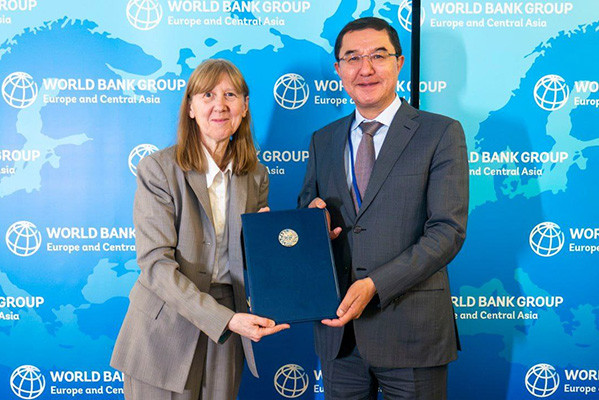Tashkent: Uzbekistan and the World Bank signed an agreement to finance a project to build a digital economy in Uzbekistan.
The agreement was signed by World Bank Vice President for Europe and Central Asia Antonella Bassani and Deputy Prime Minister – Minister of Economy and Finance of Uzbekistan Jamshid Kuchkarov on the sidelines of the spring meetings of the World Bank Group (WBG) and the International Monetary Fund (IMF) in Washington.
Antonella Bassani and Jamshid Kuchkarov held productive negotiations.
During the meeting, the parties discussed issues of deepening bilateral cooperation. In particular, the sides reviewed the Bank’s support for the government’s efforts to implement market reforms and its strategies to respond to the impacts of climate change.
The parties also welcomed the signing of an agreement on financing a project that will help Uzbekistan build a digital economy, including development, attracting investment, and creating new jobs in the IT services sector. and the signing of an agreement to finance a project to develop the digital economy reflect the desire for joint efforts in the field of reform and innovation.
This project promises to be significant for the development of Uzbekistan and the creation of new opportunities for its citizens.
Let us recall that in November 2023, the Board of Executive Directors of the World Bank approved a soft loan in the amount of US$50 million for the implementation of the project.
The project aims to support the government of Uzbekistan’s efforts to develop the digital economy and increase access for youth from rural and remote areas to digital skills training and employment opportunities in information technology-enabled services (ITES).
Uzbekistan has shown significant growth in exports in the ITES services sector from US$600,000 in 2017 to US$140 million in 2022, accompanied by an increase in the number of companies and high-paying jobs in the information technology (IT) sector. Despite the positive trends, the contribution of the entire information and communication technology (ICT) sector to the country’s GDP still remains modest and amounted to 1.9% in 2022.
The country’s development strategy until 2030 (“Uzbekistan-2030”) envisages that by the end of the current decade, Uzbekistan will transform into a Central Asian information technology hub (IT-HUB), reach the export volume of IT services up to US$5 billion per year, and increase the number of IT representative offices -there are up to 1000 companies in the country, and will also provide employment for 300 thousand young people in the IT sector. To achieve these goals, it is necessary to invest significant resources in training a workforce with appropriate digital skills, developing the necessary IT and office infrastructure, developing legislation and policies for the development of the IT sector, and providing incentives to attract foreign and local investment in the industry.
Investments in Uzbekistan’s digital economy could also help reduce the number of young people, including women, who are currently uneducated, untrained and unemployed.
A new project supported by the World Bank will help Uzbekistan use the ITES services sector as a catalyst for economic growth, job creation and foreign investment. It will be implemented by IT-Park under the Ministry of Digital Technology with the aim of training thousands of youth under the age of 30 living in rural and remote areas of the country. As part of the project, ITES companies that will hire these individuals will be provided with various incentives.
In 2029, by the time the project is completed, it is predicted that about 25 thousand people will be employed in the ITES services sector of Uzbekistan and about 15 thousand people will be able to get work in related industries. The project aims to contribute to achieving these goals by supporting various activities.


